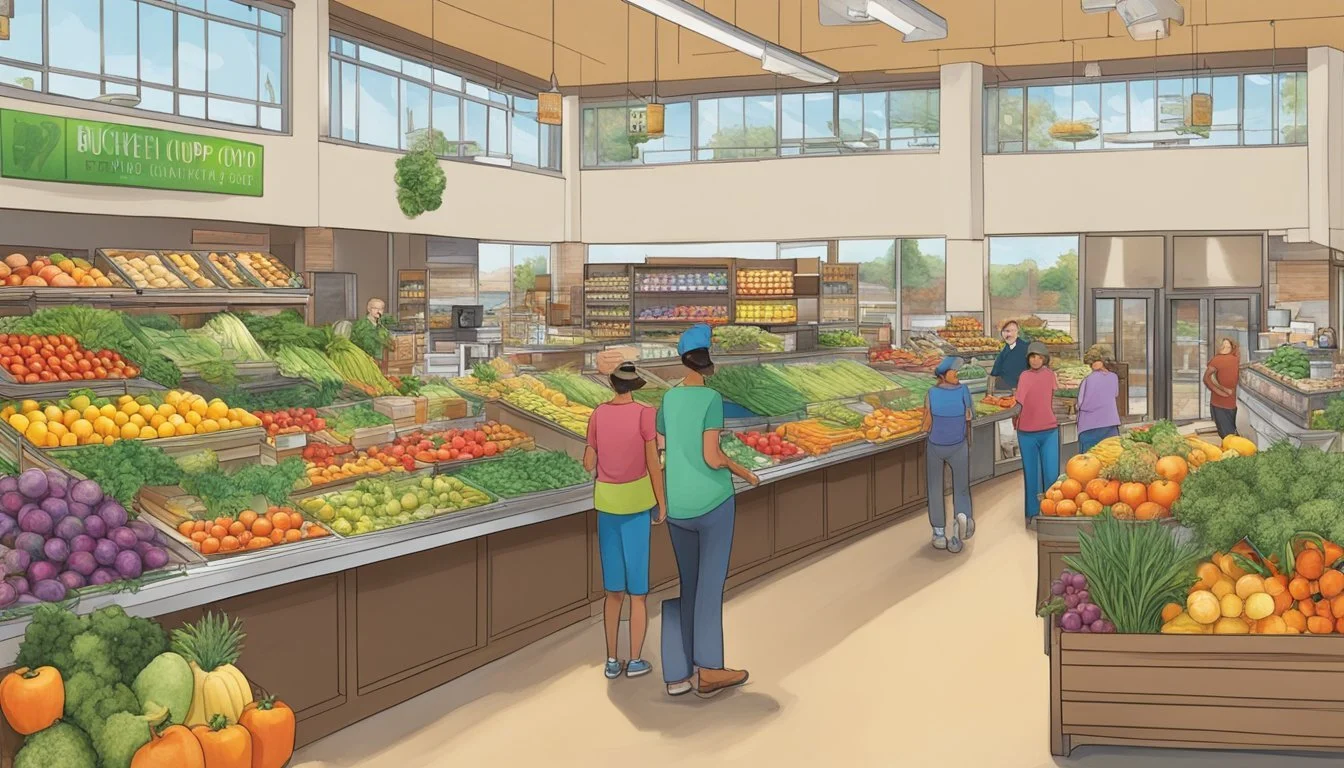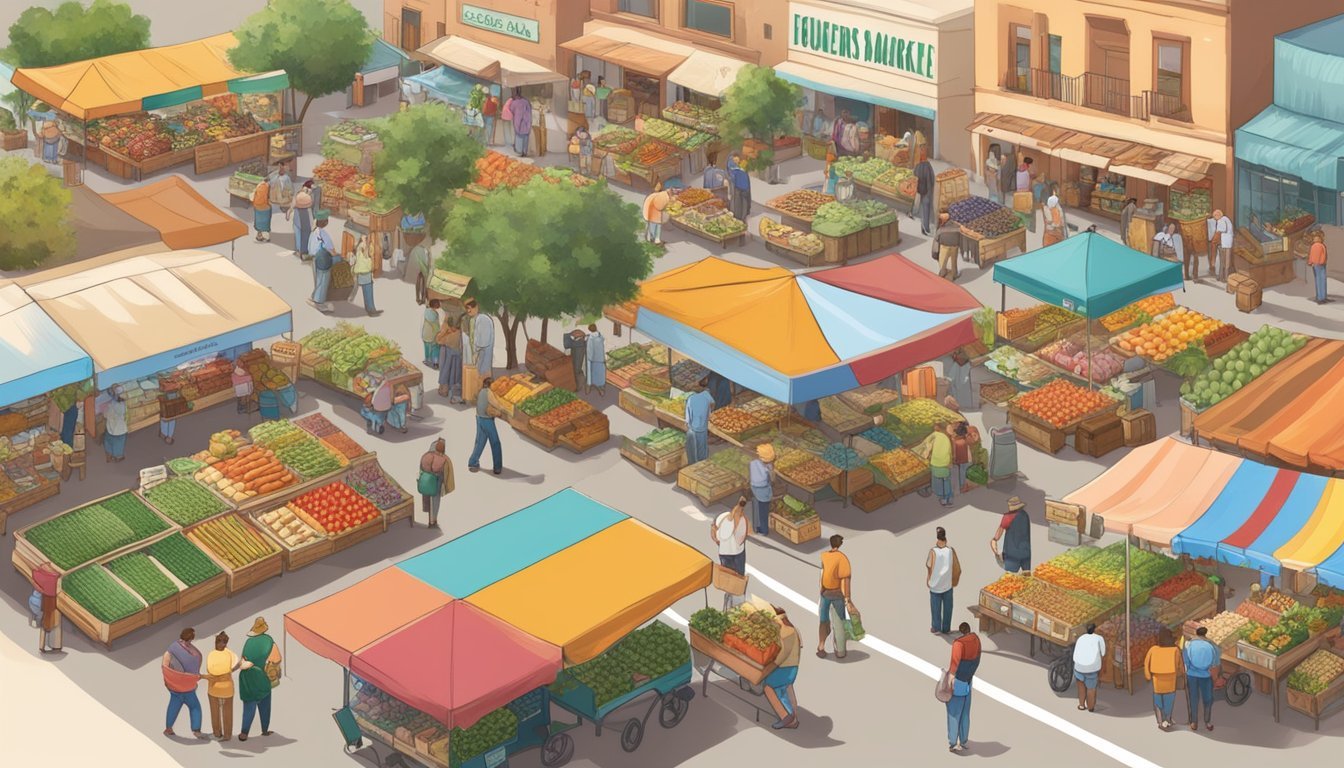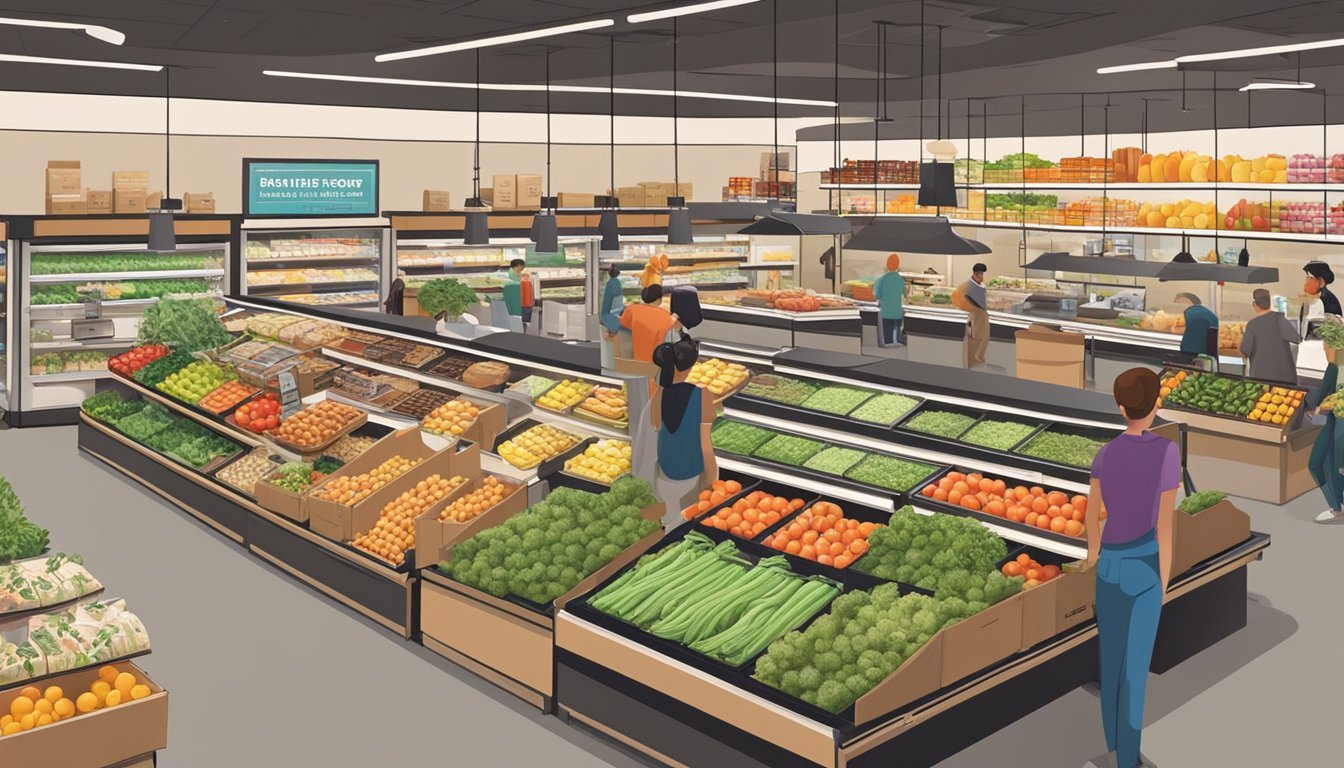Guide to Food Co-Ops in Buckeye, AZ
Your Access to Local, Fresh Produce
Buckeye, Arizona, a burgeoning city in the West Valley region of Phoenix, has witnessed a growing interest in sustainable and locally-sourced food options. Food cooperatives, or food co-ops, have become a cornerstone for residents seeking not only value and quality in their produce but also a sense of community involvement and support for local agriculture. Unlike traditional grocery stores, food co-ops are customer-owned and democratically run, often emphasizing organic and health-conscious products.
The demand for such ethical shopping experiences in Buckeye is not just a reflection of a desire to attain healthier lifestyles but also indicative of a community investing in its own economic health and social fabric. Food co-ops typically offer programs that cater to the needs of the community, including support for those on health care programs like SNAP, thus integrating social welfare into their business model. Alongside providing access to nutritious food, these co-ops often contribute to local economies, supporting Arizona farmers and producers.
In an area like Buckeye, where rapid development is bringing changes to housing and local businesses, food co-ops stand out as beacons of stability and sustainability. These establishments are not merely stores, but social hubs where education, empowerment, and personal health care converge, fostering an environment that values both the producer and the consumer. They are a testament to the community's commitment to maintaining a connection to their food, land, and each other, offering a model of commerce that prioritizes mutual benefit and well-being.
What Is a Food Co-op?
A food co-op serves as a member-owned grocery store, prioritizing local, ethical, and organic products. They offer a distinct model of shopping that supports community development and provides members with a say in business operations.
History and Principles of Cooperatives
Cooperatives date back to the 19th century, embodying values like self-help, democracy, equality, and solidarity. In a food co-op, members adhere to the Seven Cooperative Principles: voluntary and open membership, democratic member control, member economic participation, autonomy and independence, education, training, and information, cooperation among cooperatives, and concern for the community.
Benefits of Joining a Food Co-op
Members of a food co-op often enjoy fresh, high-quality produce and grocery items. They experience a range of membership benefits including a voice in co-op governance, potential discounts, and supporting the local economy. Additionally, co-ops focus on products that align with ethical and sustainable values, including organic options.
Differences Between Food Co-ops and Traditional Grocery Stores
Unlike supermarkets, where profits go to external investors, food co-ops cycle funds back into the store and its offerings, enhancing the variety and quality of goods. Food co-ops emphasize community support through member control and decision-making, contrasting with the top-down management of typical grocers. They focus on value-driven services rather than solely on financial success.
Cooperatives are tailored to meet the specific needs of their community, often providing unique and locally sourced items that traditional grocery stores might not carry. They foster direct relationships between consumers and food producers, making cooperatives an integral part of a robust local economy.
Finding a Food Co-op in Buckeye, AZ
When searching for a food co-op in Buckeye, AZ, residents have the option to explore local networks and online resources. This section guides individuals through the available local co-op locations and online tools to find community-focused, high-quality groceries.
Local Co-op Locations and Networks
Buckeye, Arizona, is served by food co-ops that specialize in providing local and organic products. Topline Foods, while based in Phoenix, AZ, is one such provider that has been recognized for their organic offerings, having started its operations in the Valley in 1998. For those seeking local co-op groceries, Buckeye can utilize this network to access organic and locally produced goods.
All Faith Community Services
Address: Buckeye, AZ 85326
Email: (Information not provided)
Services: Offers emergency food boxes, hot meals, and other resources to those in need within the West Valley area.
Buckeye's food co-op options often include a variety of structures, such as worker-owned, customer-owned, or a combination of the two. Residents are encouraged to participate in these co-ops to gain access to high-quality, locally-sourced products while supporting the local economy and community development.
Online Resources and Social Media
For current and up-to-date information, online resources serve as a valuable tool in the search for food co-ops. Websites like LocalHarvest provide searchable databases to find co-ops and other local food resources. Social media platforms are also utilized by co-ops for outreach and engagement. Prospects can follow these platforms to stay informed about co-op news, community events, and membership opportunities.
LocalHarvest
Find food co-ops and local food sources by searching their database specifically for Buckeye, AZ.
Utilize social media channels like Facebook or Twitter to connect with food co-ops for information on memberships and services offered.
Residents are encouraged to leverage both online resources and social media networks to obtain the most current information and directly connect with the food co-ops in and around Buckeye, AZ. These tools effectively broaden the reach and facilitate stronger community ties with local businesses.
Participating in the Co-op Community
Participation in a food co-op is a unique experience, deeply rooted in community support and member control. Here, members unite to invest in mutually beneficial resources, volunteer their time, and enhance their understanding through educational programs.
Membership Requirements and Application Process
To join a food co-op in Buckeye, AZ, individuals must generally meet specific membership criteria and complete an application process. Typically, this involves purchasing a membership share or paying an affordable fee, which signifies both financial support and vested interest in the co-op.
Key steps in the application process include:
Filling out a membership form with personal details.
Paying a membership fee, which varies by co-op but is set to be inclusive.
Agreeing to the co-op's member policies, which outline the expectations and rights of all members.
Volunteer Opportunities and Involvement
Food co-ops thrive on the efforts of volunteers, offering members a variety of opportunities to contribute their time and skills. Volunteers may receive benefits such as discounts or credit, strengthening the co-op while acquiring community support.
Volunteer roles can include:
Participating in store operations, such as stocking shelves or cashiering.
Assisting with events or educational programs.
Helping with administrative tasks or marketing efforts.
Offering professional skills, like legal or financial advice.
Educational Programs and Events
Educational outreach is a cornerstone of the co-op's mission, emphasizing the importance of food sustainability, healthy living, and supporting local producers. Programs and events are designed to inform members and the community at large.
Education and Training offerings might consist of:
Workshops on nutrition and food preparation.
Information sessions on the benefits of organic and local eating.
Training for new members to understand cooperative principles and operations.
Special community events which may include partnerships with local farms and businesses.
Food co-ops in Buckeye foster continuous education and actively promote member involvement. Through these pathways, they not only provide access to quality food but also strengthen the fabric of the local community.
Supporting Local Agriculture and Producers
Food co-ops in Buckeye, AZ, serve as pivotal access points to support local agriculture and producers. They contribute to the local economy by fostering direct relationships with area farmers and offering an array of seasonal, regionally-grown produce.
Direct Partnerships with Local Farms
Food co-ops are essential for enabling farmers in and around Buckeye to connect directly with consumers. These partnerships:
Ensure farmers receive a fair price for their produce by reducing the number of intermediaries.
Provide local farms with consistent demand, which aids in their financial stability and allows for investment back into their operations.
Contribute to the sustainability of the local ecosystem, as farmers often employ practices that preserve the environment.
Highlights of these partnerships include:
Local Grass Fed Beef: Offered by farms such as Topline Foods, which packages meat in small quantities for consumer convenience.
Organic Produce: Many farms engage in organic farming, ensuring that the produce is free from synthetic pesticides and fertilizers.
Seasonal Offerings and Product Variety
Food co-ops prioritize seasonal selections, which benefits both the local economy and consumers by:
Offering freshness and nutritional quality, as locally sourced fruits and vegetables are often harvested at peak ripeness.
Encouraging consumers to try new varieties of produce that they might not find in conventional grocery stores.
Examples of seasonal offerings may include:
Summer: A bounty of stone fruits, melons, and tomatoes.
Fall: Root vegetables and a variety of squashes.
This seasonality ensures a constantly rotating inventory, which not only supports the production calendar of local farms but also introduces consumers to the diverse range of produce that Arizona's unique climate can offer.
Member Benefits and Economic Aspects
Food cooperatives in Buckeye, AZ, offer their members a range of tangible economic benefits and the opportunity to contribute to the local economy's development. These co-ops function not only as food retail outlets but also embody a structure for member economic participation and community investment.
Member Discounts and Savings
Members of food co-ops typically enjoy various discounts and savings that demonstrate immediate value. They may receive:
Lower prices on high-quality products through collective buying power.
Special deals exclusive to members, including:
Discounts on bulk purchases.
Credit or dividends based on the cooperative's performance.
Additionally, members have input on the co-op's offerings, ensuring that products align with their preferences and values.
Economic Impact and Community Investment
The local economy in Buckeye, AZ, benefits significantly from the operation of food co-ops through:
Job creation, providing employment opportunities with fair treatment of workers.
Mobilizing resources locally, where profits are often reinvested into the community, fostering further economic development.
Supporting local suppliers, enhancing the financial health of the area and reducing food miles.
Member economic participation extends beyond savings as members invest in the co-op's capital, promoting a more resilient local economy.
Co-op Expansion and Diversification
Food co-ops in Buckeye, AZ, are exploring new avenues for growth by launching innovative services and departments, as well as by building stronger networks through collaboration with community services. This proactive approach not only diversifies their offerings but also solidifies their role as a pivotal part of the local economy and community well-being.
Launching New Services and Departments
Co-ops in Buckeye are continuously evolving by introducing a variety of services to meet diverse consumer needs. For instance:
Health and Wellness: Some co-ops have integrated health care services within their spaces, offering nutritional counseling and wellness workshops.
Housing Initiatives: By considering the addition of housing solutions, co-ops can support sustainable living and community stability.
The diversification into new departments such as local artisan products further widens the co-ops' appeal and underlines their commitment to local economic empowerment.
Collaboration with Other Community Services
Strong networks are the backbone of any thriving co-op. In Buckeye:
Cooperation Among Cooperatives: There's a concerted effort to partner with nearby co-ops which results in a more robust mutual support system.
Civic Engagement: Co-ops are joining forces with local initiatives (networking) to deliver services that have a high impact on community development.
Food co-ops leverage these collaborations to offer comprehensive services, thereby fostering an environment where both the co-op and the community can prosper together.
Reviews and Feedback
Evaluating the experiences and opinions of those who participate in food co-ops is integral to understanding the value and service quality these organizations offer. Both online narratives and direct feedback are tools that can measure member satisfaction and areas in need of enhancement.
Online Reviews and Testimonials
Users often turn to online platforms to express their satisfaction or concerns with food co-ops. In Buckeye, AZ, the Bountiful Baskets Food Co-op has received mixed feedback, indicating the cooperative's commitment to providing organic options. Testimonials from co-op members can serve as indicators of the services and the quality of products on offer. They provide insights into the cooperative's operation, with reviews highlighting the direct control members have over the choices available within the cooperative.
Pros:
Fresh, organic produce availability
Member control over product selection
Cons:
Potentially higher costs for organic options
It is important to scrutinize these reviews for an unbiased evaluation of the co-op's performance.
Feedback Channels for Continuous Improvement
Food co-ops typically have established channels through which stakeholders can provide feedback. This may include member meetings, suggestion boxes, or digital platforms. Co-ops value this direct communication, as it empowers member control and enhances accountability. Such mechanisms reflect the cooperative principle of democratic member control, allowing for regular reviews and updates of the co-op’s services.
Feedback Tools:
Meetings: Facilitate direct dialogues and decision-making
Online Forms: Convenient for members to suggest improvements
These channels ensure that the co-op remains responsive to its members' needs and aligned with community values.
Additional Resources
This section provides tailored information on local food-focused collaborations and illustrative resources for residents of Buckeye, AZ, and the surrounding communities. These resources are essential for those interested in joining or starting a food co-op and for anyone who wants to engage more deeply with their local food systems.
Related Local Initiatives and Buying Clubs
Local initiatives in Buckeye and nearby Phoenix have established networks where individuals can connect with food producers, support community programs, and participate in buying clubs. Topline Foods is an example of a food producer that offers local grass-fed beef and other products, catering to those interested in sustainable, locally-sourced food options. Residents can join buying clubs to purchase fresh produce directly from local farmers with the benefits of reducing food miles and strengthening the community's economy.
Maps and Guides to Local Food Systems
For those looking to visualize and navigate the local food landscape, maps and guides are indispensable tools. They offer a comprehensive view of where to find farmers markets, local food producers, and existing community-supported agriculture programs. The availability of these resources encourages people to make informed choices about their food sources, promotes awareness of local food production, and fosters a sense of connection between consumers and growers. Access to accurate maps and guides enables individuals to actively participate in and contribute to their local food system, bolstering community resilience and sustainability.







